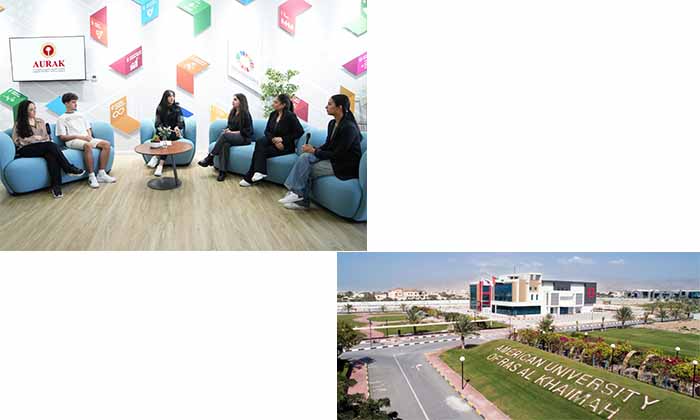AURAK supports COP28 goals with multiple activities and research, driven by sustainability and renewable energy
Students participate in Expo Live University Innovation Program competitions and Universities Climate Network, and host on-campus roundtables
In an effort to amplify the UAE’s frontline position as a leader in the fight against climate change, the American University of Ras Al Khaimah (AURAK) has ramped up its activities to support the goals of COP28, the global event that is being hosted by the UAE at Dubai Expo City from November 30 to December 12, 2023.
AURAK has been an active participant in COP 28 events through competitions and presentations, such as the Expo Live University Innovation Programme at Expo City Dubai, where the students were engaged in a roundtable discussion on climate action and the role of universities and students in addressing climate challenges. AURAK students have qualified for the final round.
AURAK is a Climate Action Partner of the Universities Climate Network (UCN), which unites UAE’s 32 prestigious universities and higher education institutions, collaborating passionately to ignite enthusiasm among young minds and academia.
In addition, students’ teams are actively engaged in two projects focused on bio-based, low-cost CO2 capture and sequestration via photosynthesis, and Circular Integrated Systems using Brine treatment as a promising strategy to eliminate brine discharge.
Recently, AURAK hosted a roundtable discussion on how the UAE had positioned itself as a dominant player in climate action on the global stage, with students presenting insights into significant initiatives shaping the nation’s climate change agenda.
Dr. David A. Schmidt, President of AURAK, commented: “At AURAK, we consider it an honor and a duty to align the AURAK Community’s focus with that of COP28, an event set to significantly address climate change. Our students, faculty and staff are engaged actively in supporting the UAE’s stance on climate change by initiating ground-level projects and campus events. Our endeavor is to ensure that the message of COP28 takes root in the psyche of each student who in turn can then impact the community at large.”
Dr. Tahseen Anwer Arshi, Associate Provost for Research & Community Service and Director of the Centre for Innovation and Entrepreneurship at AURAK, said: “AURAK is committed to the UN’s sustainable goals, and as a Climate Action Partner, we have participated in several competitions related to sustainability and COP 28, apart from hosting student activities inspired by COP28 themes and goals. We believe this is an ideal mega-event for engaging the student community in topics that lie at the core of global efforts in saving our planet, and we see greater opportunities as we draw closer to the start of COP28.”
Dr. Tahseen oversaw the roundtable discussion featuring six chemical and mechanical engineering, mass communications, and biotechnology students. The students discussed how the UAE had positioned itself regarding climate action on the global stage on the road to COP28. The roundtable focused on the role of universities in advancing climate action and sustainability within their campuses and the broader community. It deliberated on how the faculty and AURAK students could actively engage in climate action and sustainability efforts through research and competitions.
AURAK’s initiatives as a Climate Action Partner included participation in the Expo Live University Innovation Competition and the iGem Mena League Competition. AURAK has also produced a COP28-dedicated research bulletin, circulated to all AURAK’s internal and external stakeholders.
Among the headline projects of AURAK students are (a) Novel Mocroalgae-based Bio CO2 sequestration systems and (b) Novel Circular Integrated Systems for Brine Mining and Green Hydrogen.
In the first project, to close the gap of global GHG emissions in achieving net-zero goals, native microalgae-based low-cost CO2 sequestration systems are developed to produce several value-added products like sustainable aviation fuels, biohydrogen, and food additives for aquaculture. These solar-driven tubular photobioreactors create a positive environmental impact by addressing SGDs 11 & 13.
The Novel Circular Integrated Systems enable zero-liquid brine discharge from energy-intensive desalination plants and a promising strategy to recover valuable resources, such as minerals and metals. Further, using pure water recovered from brine combines with solar energy to produce Green hydrogen, thus reducing fossil fuel dependency and aligns with SGDs 7 & 14.


Comments are closed.